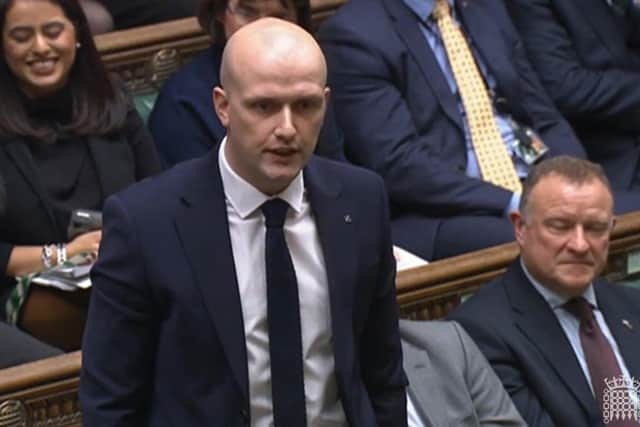SNP's Westminster leader denies de facto referendum plan 'deflating'
Stephen Flynn said the people of Scotland needed to be offered a choice “sooner rather than later”, but added that debate is a good thing.
The SNP is to hold a “special democracy conference” in March to decide the way forward to secure independence, after the UK Supreme Court ruled in November that the Scottish Parliament does not have the power to hold another vote on the issue.
Advertisement
Hide AdAdvertisement
Hide AdFollowing the ruling, First Minister Nicola Sturgeon said the SNP will fight the next general election as a de facto referendum.


However, the SNP’s National Executive Committee (NEC) has also set out an alternative option of contesting the next Scottish Parliament election in 2026 on that basis.
At a meeting on Saturday, the NEC unanimously agreed the wording of a draft resolution to be debated at the conference in March.
Speaking on the BBC’s Sunday Show, Mr Flynn said: "I have very much come to the conclusion, as things stand, that a Westminster general election is the best option for us. And I’ll explain why, if that’s OK.
"It’s primarily focused on hope. We need to offer the people of Scotland, sooner rather than later, the opportunity to do things better and to do things differently.
"We know going into that next general election, the Conservatives are going to be led in all likelihood by either Rishi Sunak or Boris Johnson, if he does make a comeback – but we know the damage they’ve done over the course of the last 13 years.
"The UK economy is expected to be in the longest and deepest recession of all G7 nations this coming year, we know that inflation is at a 40-year high, we know that interest rates are at levels last seen in the early 2000s, as indeed are wages, sadly. We know the damage they’ve caused.
"The alternative for us at the moment, which is put forward to us, is for Keir Starmer to become Prime Minister. But when it comes to the big issues of the day, when it comes to the membership of the single market and customs union, when it comes to freedom of movement, when it comes to Scotland’s right to democratically choose its future, Keir Starmer is very much in line with the Conservative Party.
Advertisement
Hide AdAdvertisement
Hide Ad"So I believe that it is incumbent upon us to go into that general election to say to the Scottish people, we can offer you something different, we can offer you something better, we can offer you a little bit of hope, and let’s go from there.”
However, he said there are “a broad range of views” in the party and the wider independence movement, and it is “healthy” to have a democratic debate about the issue.
Put to him that the “air is coming out the balloon a bit” and the de facto referendum plan is “deflating fairly rapidly”, Mr Flynn said: “I don’t think that’s a fair reflection. I actually think it’s a good thing.
“Conversely, I think if the First Minister, or the Scottish National Party’s NEC had gone to conference with one position, then we’d probably be getting criticised for not allowing members the opportunity to debate. But we’ve sought to grasp the thistle a little bit, for want of a better phrase – to let members have their say, and I think that’s a good and healthy debate to have.”
Ms Sturgeon previously said the SNP’s preferred route remains a referendum along the same lines as 2014.
She said: “However, if Westminster continues to block a referendum – and if Scottish democracy is not to be negated as a result – an alternative democratic means of allowing the people of Scotland to express their will must be found.
“The purpose of the special democracy conference is to allow the SNP to debate and decide which alternative route it wishes to offer the people of Scotland.”
She added: “It sets out – as I did last June – the option of contesting the next Westminster election as a de facto referendum.
“However, in the interests of a full and open debate, it also sets out the alternative option of contesting the next Scottish Parliament election on this basis.”
Comments
Want to join the conversation? Please or to comment on this article.
